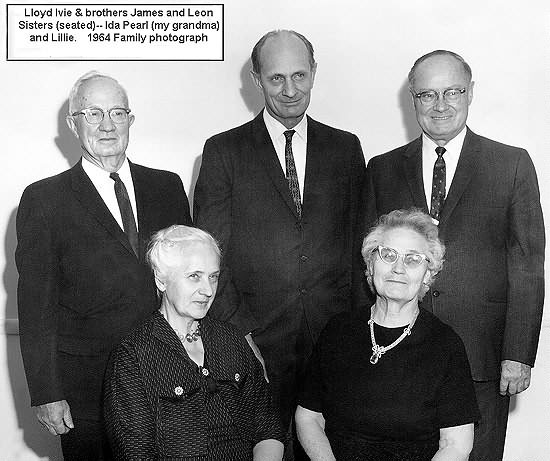Lloyd Ivie during the Great Kanto Earthquake
(Epilog)

Lloyd Ivie
and Siblings 1964
(The Following
Information was Provided by Provided by, D. Staples, Kansai Branch,
Japan.)
When the Earth Begins to Tremble.
. . . conclusion
This ends Lloyd Ivie's account of the visit to Tokyo to report on members and missionaries. Fortunately, all were found safely despite loss of homes. By comparison, LDS lives were lost in the Kobe earthquake on 17 January 1995 which involved 6,000 total fatalities, less than 10% of the toll in the Kanto Earthquake. This reflects two things-- (1)the greater number of members and (2)the improvements in construction.Not long after the Kanto Earthquake, President Heber J. Grant, who had been among the first group of missionaries to open Japan to the Gospel, made the painful decision to close the mission. The decision reflected the serious deterioration in relations between Japan and the United States as well as the limited success of missionary work. Lloyd Ivie returned home greatly discouraged but with an affection for the Japanese people that would survive the mission closing and a World War.
The converts made during the two decades the mission was opened were to remain largely faithful and form the seeds for easing the church back into Japan after the war. Some would make their way to Utah. Among them was Brother Tatsui Satoh, who translated the Doctrine & Covenants and Pearl of Great Price into Japanese. This was the first complete translation. Even though the translation has since been simplified, many linguists feel Brother Satoh's translation was more literal and true to the classical language in the original.
Lloyd Ivie's work with and love for the Japanese did not end with the closing of the mission. He was put to work in the Salt Lake City post office to assist Japanese members who had immigrated as well as some who had fled discrimination in California. Utah had the sad duty of hosting two relocation camps during the war. It is said that the kind treatment from the LDS members in the state and especially the encouragement of Lloyd Ivie brought some of them into the Gospel and more to Salt Lake City, even if they did not join the church. Visitors to Utah are often surprised to find the variety of Japanese culture, cusine and speakers in what was once among America's most isolated and provincial locations.
We owe the pioneers of the Gospel in Japan much gratitude and the nation has been blessed by it. Perhaps as a long-term resident in Japan, one of the most rewarding things about the Christian community here is, although small, it contributes much. There is very little bigotry or badmouthing between Christian denominations. The sad experience of the war has helped to create one of the most religious tolerant people on earth and while all the foreigners who come here may not be tolerant, most of those who choose to stay certainly are. Several
of Lloyd Ivie's relatives have served as missionaries in Japan and this writer, at least, will soon have spent as many years here.
|